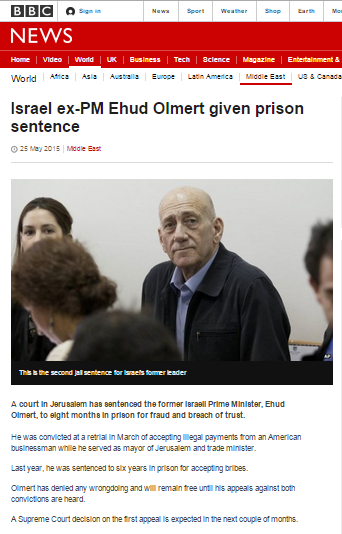An article which appeared on the BBC News website’s Middle East page on May 25th under the headline “Israel ex-PM Ehud Olmert given prison sentence” misleads BBC audiences with regard to past rounds of “the peace process”.
The report states:
“Olmert served as prime minister from 2006 to 2009.
He was forced to resign amid a flurry corruption allegations, which ended his political career and disrupted the peace process with the Palestinians.”
So the BBC would have its audiences believe that negotiations with the Palestinian Authority (not, as claimed, with “the Palestinians” as a whole, which of course includes Hamas and other factions that reject negotiation with Israel) during Olmert’s term failed to come to fruition because they were interrupted by Olmert’s resignation.
Ehud Olmert’s term of office ended on March 31st 2009. Following the Annapolis conference in late November 2007, his government conducted negotiations with the Palestinian Authority throughout most of the following year.
In August 2008 – half a year before Olmert’s term of office ended – the Israeli daily Ha’aretz ran a story headlined “PA rejects Olmert’s offer to withdraw from 93% of West Bank“.
“Palestinian President Mahmoud Abbas on Tuesday rejected an Israeli peace proposal, which included withdrawal from 93 percent of the West Bank, because it does not provide for a contiguous Palestinian state with Jerusalem as its capital.
Nabil Abu Rdainah, Abbas’s spokesman, told the official Palestinian news agency WAFA that Prime Minister Ehud Olmert’s plan showed a “lack of seriousness.”
Under the proposal, Israel would return to the Palestinians 93 percent of the West Bank, plus all of the Gaza Strip, when the Palestinian Authority regains control over the Gaza Strip, which the militant group Hamas seized from forces loyal to Abbas in June 2006.
Olmert presented Abbas with the proposal as part of an agreement in principle on borders, refugees and security arrangements between Israel and a future Palestinian state.
In exchange for West Bank land that Israel would keep, Olmert proposed a 5.5 percent land swap giving the Palestinians a desert territory adjacent to the Gaza Strip.”
In September 2008, Olmert and Abbas met again.
“…Olmert presented the details of his offer for a peace deal between the nations, an unprecedented Israeli offer to be tendered to a Palestinian leader.
Olmert essentially agreed to forgo sovereignty of the Temple Mount in Jerusalem, Judaism’s holiest site, and proposed that in the framework of a peace agreement, the area containing the religious sites in Jerusalem would be managed by a special committee consisting of representatives from five nations: Saudia Arabia, Jordan, Palestine, the United States and Israel. […]
Olmert and Abbas asked Erekat and Turgeman to meet the next day with map experts in order to reach a final version of the border between Palestine and Israel.
But the next day, the Israeli side claims, Erekat phoned Turgeman and asked to postpone their meeting by 24 hours. A few hours after this call Erekat called back and said that Abbas had to go to Amman. Erekat explained that Abbas would update the Jordanians and the Egyptians about Olmert’s offer in order to receive their support and the parties would meet again the following week. “From that time, I am still waiting for Abbas’s telephone call” Ehud Olmert told Sof Hashavua.”
The details of the unanswered proposal were publicized by Ha’aretz after Olmert left office.
“Olmert’s office said in response to the disclosure of the plan: “On September 16, 2008, [Olmert] presented Palestinian Authority President Abu Mazen [Mahmoud Abbas] a map that had been prepared based upon dozens of conversations that the two held in the course of the intensive negotiations after the Annapolis summit. The map that was presented was designed to solve the problem of the borders between Israel and the future Palestinian state. Giving Abu Mazen the map was conditioned upon signing a comprehensive and final agreement with the Palestinians so it would not be used as an ‘opening position’ in future negotiations the Palestinians sought to conduct. Ultimately, when Abu Mazen did not give his consent to a final and complete agreement, the map was not given to him.””
Interestingly, the BBC’s version of history manages to both erase all Palestinian responsibility for the breakdown of that particular round of negotiations and to suggest that at the time that Olmert resigned, there was still a ‘peace process’ to “disrupt”.




